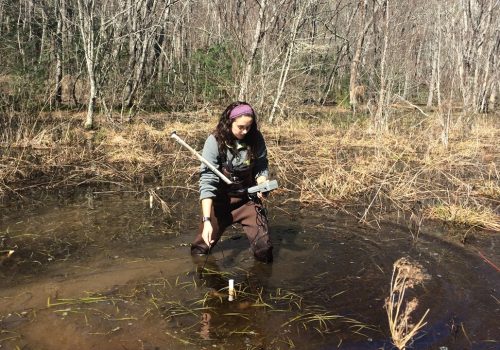Acceptance into graduate programs is competitive and we encourage undergraduates who plan to apply to graduate programs to acquire research experiences as undergraduates. Below is a summary of some of the opportunities that are available for undergraduates. Students may work with biology professors on campus, or opt to acquire research experiences through other outlets, such as the National Science Foundation’s program, Research Experiences for Undergraduates.
Research with Biology Professors at UNC Asheville
Students who wish to do field/laboratory research should apply for “research positions” with individual faculty members. Faculty will select their research students from the field of applicants. It is possible that you will not be selected to work with the faculty member of your choice. A faculty member may have a full complement of research students already, or may have applicants with better preparation for the kind of research being undertaken.
Undergraduate Research
About 30% of biology majors engage in undergraduate research projects where extensive and very high quality interactions occur with one or more professors. All students who enroll in laboratory courses interact with faculty in labs and/or field experiences where the student-faculty ratio is rarely as high as 24:1 and may be as low as 7:1.
As you begin your research, keep in mind that UNC Asheville offers undergraduate research grants that may help defray the cost of that research. The Office of Undergraduate Research has information on a variety of opportunities for undergraduate research at UNC Asheville. This may allow you to participate in projects that the Biology Department alone could not fund. The University also funds students who wish to present their projects at the annual meeting of the National Conferences on Undergraduate Research. This experience involves travel with faculty and other students to another university where hundreds of other undergraduate students from around the country are also sharing their research.
BIOL 298 and 398
These are courses that provide introductory and intermediate research experiences for students. They are excellent ways to gain research experiences before embarking on your senior research project (BIOL 498).
BIOL 498 (Senior Research)
Biology majors who choose to meet the competency requirement via Senior Research are required to submit a research paper to the biology faculty and make an oral presentation to the department or at a scholarly meeting such as NCUR. Work on your senior research will generally require at least a full academic year. Students must complete the Contract for Undergraduate Research Projects Form and have a research committee. Committee members will discuss the merits of the candidate’s research based on the research paper and the candidate’s oral presentation, then decide upon a grade. If you do not turn in a satisfactory paper, you will not graduate. Keep in mind that you are demonstrating your mastery of biological concepts and your competence in evaluating evidence. This is a serious requirement that demands your best effort.
If you really want to do a field/laboratory project, but prefer to work on a project of your own design rather than doing a part of the faculty research project, a faculty member may choose to advise you. The advice you will get may be somewhat less insightful and the technical assistance less specialized, but it should be enough to facilitate the project. Every research proposal must ultimately be evaluated and approved by the research committee.
Research with Scientists Elsewhere
You may wish to have research experiences at other institutions, and opportunities are available that may count towards credit for BIOL 498. The National Science Foundation Program (Research Experiences for Undergraduates or NSF-REU) is specifically designed to provide undergraduate research experiences at sites around the country. Host sites are located through the country and have specific themes (e.g., cell and molecular biology; tropical botany) for each site. Typically, 8-10 students are selected to work at each site under the direction of professors who are conducting research. Stipends are available to cover room-and-board and other expenses. The GREAT group provides summer research opportunities for students interested in cell, molecular, and biomedical fields.
